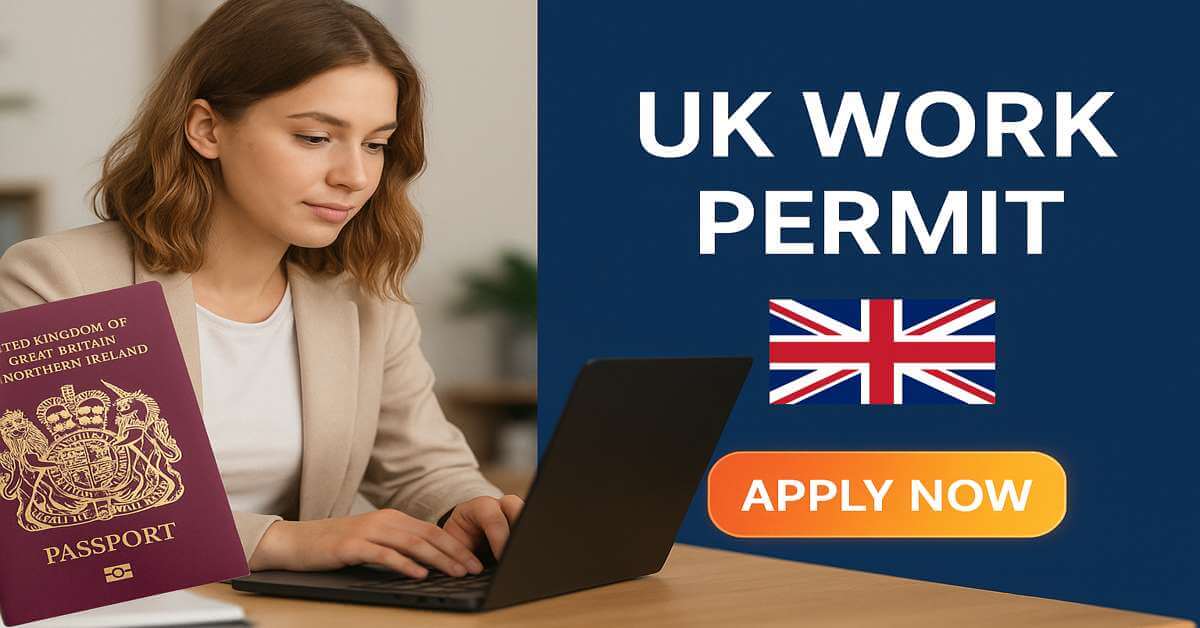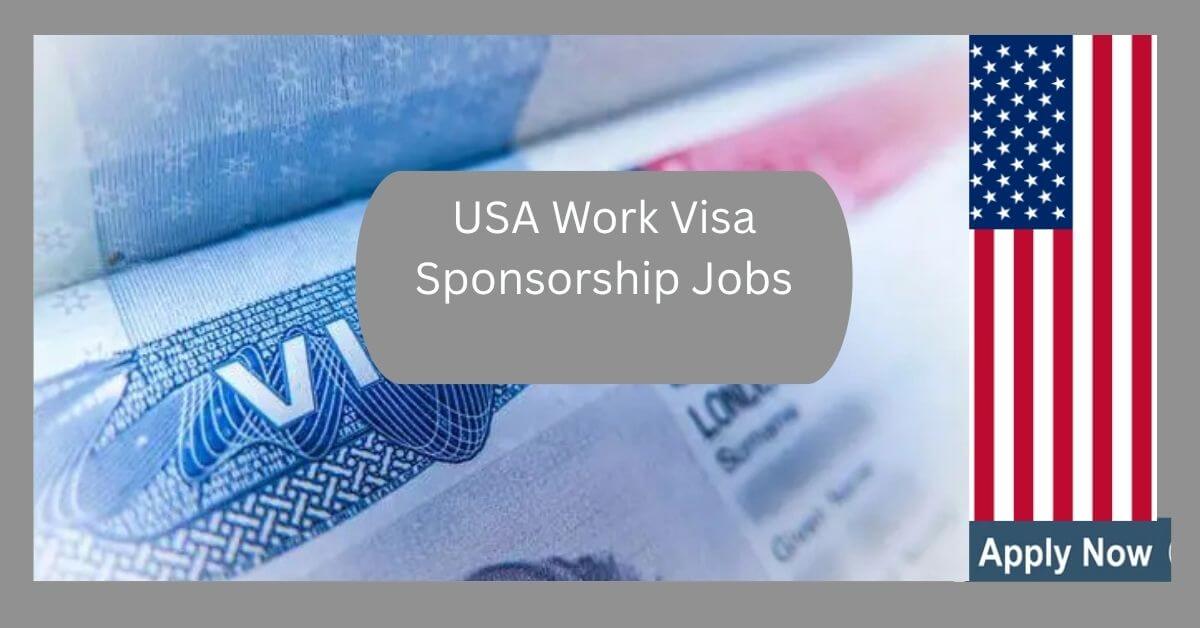UK Work Permit 2025 – How to Go in UK

To secure a work visa or permit for the UK, you generally need a job offer from an employer who holds a valid sponsorship licence. There are a few exceptions to this rule, such as the High Potential Individual (HPI) visa and the Graduate visa, which are explained below.
Since Brexit, EU nationals who wish to work in the UK also require a work visa or permit. However, EU nationals with pre-settled or settled status under the EU Settlement Scheme do not need a work visa and are permitted to work in the UK.
There are several types of UK work visas and permits available, including:
- Skilled Worker Visa
- Scale-up Visa
- Temporary Worker Visa
- Global Business Mobility Visa
- High Potential Individual Visa
- Graduate Visa
- Global Talent Visa
- UK Ancestry Visa
Skilled Worker Visa:
The Skilled Worker visa is a sponsored work route that enables skilled foreign nationals to work in the UK. It replaced the previous Tier 2 (General) visa. To apply for a Skilled Worker visa, applicants must score enough points under the Home Office’s points-based immigration system by:
- Having a job offer from a licensed sponsor
- Holding a Certificate of Sponsorship (CoS)
- Working in an eligible occupation on the Home Office’s list
- Meeting minimum salary requirements (£38,700 or the “going rate” for your occupation, whichever is higher; lower salary thresholds may apply in certain cases, e.g. for jobs on the Shortage Occupation List, applicants under 26, or those with a relevant PhD)
- Meeting the English language requirements
Skilled Worker visa holders are usually permitted to stay for up to five years, after which they can apply to extend their visa or pursue permanent settlement (Indefinite Leave to Remain, ILR).
Health and Care Worker Visa:
The Health and Care Worker visa is similar to the Skilled Worker visa but is specifically designed for qualified doctors, nurses, health professionals, and adult social care workers who are sponsored to work for a licensed employer in the UK’s health and care sector. Applicants must hold a qualifying job and meet the relevant salary requirements for their occupation.
Check Also: Bartender Jobs in UK with Work Permit & Visa Sponsorship – Apply Now
Scale-up Visa:
The Scale-up visa was introduced. It is aimed at foreign nationals with high levels of skills or qualifications who are sponsored to work for UK businesses experiencing rapid growth (“scale-up companies”).
Key requirements include:
- A high level of skills or being academically elite
- A Certificate of Sponsorship when applying for the first time (though sponsorship may not be required for subsequent extensions)
- A skilled job offer from a scale-up business (defined as a business that has grown its staff or turnover by at least 20% annually over the past three years)
- A salary of £33,000 or more
- Sufficient knowledge of English
The Scale-up visa can be renewed and may provide a route to settlement in the UK after five continuous years of residence.
Temporary Worker Visa:
Temporary Worker visas allow foreign nationals to work in the UK for a limited time in specific sectors. Types of Temporary Worker visas include:
- Charity Worker Visa
- Creative Worker Visa
- Government Authorised Exchange Visa
- International Agreement Visa
- Religious Worker Visa
- Seasonal Worker Visa
Temporary Worker visas are typically granted for between three months and two years, depending on the visa category. In most cases, applicants must:
- Be at least 18 years old
- Have a job offer and a Certificate of Sponsorship from a licensed temporary worker sponsor
- Demonstrate sufficient personal savings (at least £1,270)
While it’s often possible to extend a Temporary Worker visa, there is usually a maximum permitted length of stay. These visas do not lead directly to settlement in the UK; however, holders may be able to switch to a different visa category, such as the Skilled Worker visa, if eligible.
Global Business Mobility Visa:
The Global Business Mobility (GBM) route includes several visa categories designed to help overseas businesses establish or operate in the UK. This scheme allows existing employees of overseas companies to come to the UK for work assignments or to set up a new branch or subsidiary. The five new visas under this route are:
- Senior or Specialist Worker Visa (replacing the Intra-Company Transfer visa)
- Graduate Trainee Visa (replacing the Intra-Company Graduate Trainee visa)
- UK Expansion Worker Visa (replacing the Sole Representative of an Overseas Business visa)
- Secondment Worker Visa
- Service Supplier Visa
Applicants must have a Certificate of Sponsorship and meet specific eligibility criteria for their chosen visa. Maximum permitted stays vary from six months (e.g. for the Service Supplier Visa) to five years (e.g. for the Senior or Specialist Worker Visa). None of the GBM visas leads directly to settlement in the UK, but switching to other visas that do provide settlement routes is often possible.
Working in UK Without a Job Offer:
It is possible to obtain a work visa for the UK without a job offer by applying under the High Potential Individual visa, the Graduate visa, or the Global Talent visa. However, these visas have specific eligibility requirements.
High Potential Individual Visa:
The High Potential Individual (HPI) visa is a relatively new route for foreign nationals who have recently graduated with a degree from a university on the Home Office’s Global Universities List. No job offer is required, and visa holders are free to look for work in the UK once they arrive.
Key requirements:
- Be at least 18 years old
- Hold a degree-level qualification from a university listed on the Global Universities List, awarded within the last five years
- Meet the English language requirement
- Have personal savings of at least £1,270
HPI visa holders can usually stay for up to two years (or three years for PhD holders). However, this visa cannot be extended, and it does not provide a direct route to settlement. Those wishing to stay longer must switch to another visa category, such as the Skilled Worker visa.
Graduate Visa:
The UK Graduate visa allows foreign nationals who have completed a degree or postgraduate course in the UK to stay and work for an additional two years (or three years if they hold a PhD).
Applicants must:
- Apply from within the UK
- Hold a valid Student visa (formerly Tier 4)
- Have successfully completed an eligible UK degree
The Graduate visa cannot be extended and does not provide a direct route to settlement, but holders may switch to other visa categories that do.
Global Talent Visa:
The Global Talent visa is designed for individuals recognised as leaders or potential leaders in academia or research, arts and culture, or digital technology. Applicants must be at least 18 and secure an endorsement from an approved endorsing body.
Successful applicants are usually granted leave for up to five years, which can be extended. The Global Talent visa also provides a route to settlement after either three or five years, depending on the applicant’s achievements and endorsement. Fast-track settlement in three years is available for those endorsed by organisations such as the British Academy, Royal Academy of Engineering, Royal Society, UK Research and Innovation, Arts Council England, or Tech Nation.
UK Ancestry Visa:
The UK Ancestry visa is designed for Commonwealth citizens and certain British nationals who have at least one grandparent born in the UK, the Channel Islands, or the Isle of Man. Ancestry visa holders can stay in the UK for up to five years and then apply for Indefinite Leave to Remain (ILR).
Eligibility criteria include:
- Being aged 17 or over
- Being a Commonwealth citizen, British overseas citizen, British overseas territories citizen, British national (overseas), or a citizen of Zimbabwe
- Applying from outside the UK
- Proving that a grandparent was born in the UK, Channel Islands, or Isle of Man
- Intending to work in the UK
- Having sufficient funds to support oneself and dependants
Benefits:
1. Legal Right to Work
You are legally authorized to live and work in the UK for a specific job and employer.
2. Pathway to Settlement
Many UK work permits can lead to Indefinite Leave to Remain (ILR) and eventually British citizenship.
3. Access to Public Services
You may be eligible for services such as the National Health Service (NHS) and certain social benefits, depending on your visa type.
4. Career Opportunities
Gain valuable international work experience and access job opportunities in one of the world’s leading economies.
5. Family Reunification
Most work permits allow you to bring dependents (spouse or partner and children) to live with you in the UK.
6. Travel Flexibility
You can enter and leave the UK freely while your work visa is valid.
7. Improved Standard of Living
Benefit from strong worker protections, fair wages, and high-quality living conditions.
8. Cultural and Personal Growth
Experience life in a diverse, multicultural society and improve your language and communication skills.
9. Opportunities to Change Employers
Certain visas, like the Skilled Worker Visa, allow you to switch jobs or employers with Home Office approval.
Other UK Work Visas and Permits:
Other immigration categories also grant permission to work in the UK, including:
- Frontier Worker Permit
- Dependant Family Visas
- Overseas Domestic Worker Visa
- British National (Overseas) Visa
- Youth Mobility Scheme Visa
Those wishing to work in the UK may also consider business visas, such as the Innovator Founder Visa or the Start-up Visa, which allow individuals to establish and run innovative businesses.
If you’re unsure about the best UK work visa route for your situation or want help determining your eligibility, consult an immigration lawyer at Reiss Edwards, who will be happy to advise you based on your individual circumstances.
Frequently Asked Questions:
How long is a UK Work Permit valid?
It depends on your visa type. For example, a Skilled Worker Visa can last up to 5 years and be extended.
What is a UK Work Permit?
A UK Work Permit is official permission that allows a foreign national to work legally in the UK, usually tied to a specific job and employer. It’s commonly issued under visa routes like the Skilled Worker Visa.
Do I need a job offer to get a UK Work Permit?
Yes. For most UK work visas, you must have a confirmed job offer from a licensed sponsor employer in the UK.



